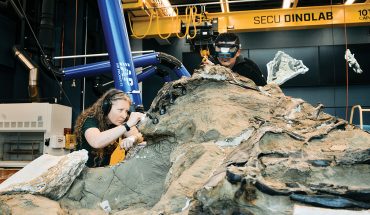by Dean King
Put an ear to a window of St. Michael’s Episcopal Church a little shy of midnight on a random Wednesday or Thursday night, and you might just hear music. Not sacred music, but roof-raising rock ’n’ roll.
That’s because the St. Michael’s rector, Greg Jones, is not only the head of one of the region’s most active and fastest-growing Episcopal churches, he is also the bass player of the Raleigh indie rock band Balsa Gliders.
Inside the church, you would find Jones, a dark-haired, boyishly handsome 44-year-old, jamming on his all-black, 1982 Spector NS2 bass and singing backup vocals with a silky tenor honed on hymns.
The band’s diverse, often acoustic-guitar-led sound draws from R.E.M., Big Star, and the Shins, to name a few, and has been described by local music scene hipsters as reminiscent of Let’s Active and Portastatic. Lead singer Charles Marshall’s soulful, Lou Reed-light cadences tell wise anthems about real life.
“Being in a rock band that only plays in drinking establishments and doesn’t sing Christian songs seems an odd fit for a priest,” Jones, a UNC-Chapel Hill alumnus, readily admits. But it also has its advantages.
“It does lend a bit of intrigue when people find out I’m in a rock band and also a priest. It’s that kind of odd conjunction of things that makes people go, ‘What?’ And so maybe they’ll listen to me a little bit, just to check it out and see, you know, what does he have to say about God?”
That would be plenty. Jones, who holds a graduate degree from New York’s General Theological Seminary, waxes forth on religious topics in such places as the Los Angeles Times, the Anglican Theological Review, and the on-line Episcopal Café, as well as The News & Observer. Also, in 2004, he published a book that detailed the religious fallacies in the book The Da Vinci Code. Usually though, he delivers his wisdom in punchy sermons, his wicked sense of irony on full display. Never precious with his spirituality, once, during a fundraising campaign at St. James’s Church in Richmond, Va., where he served as associate rector, he donned a trench coat and guitar and performed Johnny Cash’s I Walk the Line, altering the refrain to: “Because you’re mine, it’s pledging time.”
It was ministry that introduced Jones, the father of three daughters – Coco, 9, Anna, 7, and Cheyney, 4 – to his wife, Melanie Bartol Jones, a former All-American lacrosse player at Brown University, who is a marketing director and lacrosse referee. The two met when they were missionaries in Honduras in the mid-’90s.
And it was ministry that brought Jones to the Raleigh-based Balsa Gliders, a band founded in Washington, D.C., in the mid-’90s by lead singer Charles Marshall, now a Raleigh attorney (and Walter contributor), and Russ Tisinger, who currently lives in Philadelphia.
When David Morrison, a bass player for long-time Raleigh band Tin Pan Alley – and a parishioner of Jones’s – died tragically at the age of 41, Morrison’s mother, Pat, needed to dispose of a house full of band gear. Jones, whose hobbies include writing fiction and collecting musical instruments, which he buys and sells on eBay, offered to help her out. He sold four custom-made Spector basses, “all spectacular,” he says, “and not necessarily an easy sell, very expensive,” one at a time until he was down to the NS2, the least-impressive looking of them all. This one, a plain, black factory model, which he would later learn was a key model in the transformation of the bass and the most collectible of the five, he did not sell. Before he could, Pat offered it to him as a thank you for selling the others. Never mind that he didn’t play the bass.
That same night, he ran into some old acquaintances from Chapel Hill, one of whom was Marshall. “We were chatting at a party, eventually about music, and he said, ‘I’m looking for a bass player.’ And I said, ‘Well, I have a bass.’ I didn’t say I could play it. But he said, ‘Come to practice some time, and we’ll try it out.’ ”
Jones had started playing guitar when he was 10. His father, Sam Jones, of Chevy Chase, Md., whom he describes as “one of the old-folky types of a lawyer, who grew up in the Kingston Trio era,” would play song after song. “He was like a jukebox.”
It turns out, Jones’s guitar skills transferred. He picked up the bass riffs in a hurry and got the gig.
Balsa gliding
In addition to Marshall and Tisinger, Balsa Gliders now consists of Mike Ferguson (a surgeon at WakeMed and another UNC-Chapel Hill graduate) on keyboards and harmonies; Ben Davis, (a Wake Forest graduate and, like Marshall, a lawyer at Brooks, Pierce), on lead guitar; and Chuck Price, (another Tar Heel and a Charlotte banker), on drums. Tisinger (who holds a Davidson degree, an Ivy League doctorate in political science, and works at a Philly think tank), plays guitar, sings, and wrote some of the band’s core songs. But Marshall is the group’s heart and soul, lead singer and songwriter.
“The lyrics are like clever little puzzles hidden beneath bouncy pop songs that the listener can piece together with multiple listens,” wrote music critic Courtney Devores in the Charlotte Observer, of the band’s last album, Photographic Friends.
Their top gigs have come when opening up for bigger bands, like the Old 97’s, the Connells, and the indie-rock/alt-folk band Son Volt. In 2007, the Balsa Gliders opened for Son Volt. “I missed my 20th high school reunion to play a show in front of 700 people at the Lincoln Theatre in downtown Raleigh,” Jones says, “and I said, ‘Well worth it.’ ”
Last December, they played at the Lincoln with the Connells in front of more than 750. They’ve played in bars in Asheville and Charlotte, often in front of audiences half their age. In January, they played during the inaugural events for Gov. Pat McCrory. “Our band went on right before the governor, so we had him on stage with us,” Jones recalls. “I had heard he plays the drums and invited him to come up. He played for a couple minutes, and then after the show, he said, ‘Y’all are good,’ and I said, ‘I’m an Episcopal priest,’ and he said, ‘Damn.’ ”
Church and stage
Jones is at peace with the interplay of music in his life and profession, no matter the seeming contradictions. “A lot of members of the church like the band,” he says. “They come to shows.” That said, he realizes the healthy separation of church and stage. “There are not many people at the church who would be interested in us playing at the church. There’d be no real meaning for that.
“The songs are mainly about confusing subjects that only Charles really understands. They used to be about college and girls and growing up, and now I think they’re more about being married people who are middle-class, middle-aged micromanagers.”
Jones’s passion for music does, however, carry over to the church. Music reigns supreme at St. Michael’s. “I’d say it’s a defining characteristic,” he says.
Jones, who is a trustee of General Seminary and the University of the South, and serves as the current dean of the Raleigh Convocation, has seen his parish steadily rise since his arrival in 2004, and music has been a big part of that. The growth has come despite the real-estate bust shortly after his arrival, and following tension in the church over the ordination of a gay bishop that caused some conservatives to leave the parish. Still, Jones says, St. Michael’s was poised to grow and eager to do some new things. “I was excited about focusing on the basics about God and Jesus, the Gospel. Nothing particularly New Age with regard to the teaching, just the straight-up Christian message, but in a kind of a traditional Episcopal Anglican musical heritage, worship heritage.”
But he was ready to build, too, and quickly recognized what an asset St. Michael’s had in its young music director, Kevin Kerstetter. “Kevin is one of the most talented music directors, choir masters that I’ve ever had the chance to work with,” Jones says. “He is a master organist and choir leader, a music master.” Kerstetter just needed the right tools and support to blossom. So Jones began an initiative to expand the size of the music rehearsal spaces, the choir rooms, the worship space, and, above all, to build a world-class pipe organ, handmade, one of a kind, “all with the idea that Kevin would build our music program into one of the best in North Carolina.”
Jones’s first capital project, to the tune of $4 million, was a great success. “We managed to launch the week after Lehman Brothers died. We finished it with no significant debt, so the parish really stepped up during the recession and did a great thing on faith. It’s kind of amazing.”
St. Michael’s has expanded in other ways, too. “I can’t say we doubled in nine years,” says Jones, “but it feels like we have.” The parish now has 1,800 baptized members, and the average Sunday attendance, roughly 350 when Jones arrived, now hovers around 600.
Music for life
Jones sees music as a lifetime avocation. “It’s something I do to have a fuller life. In that sense, it’s related to the ministry, which is a part of my life that is intrinsic to who I am, so in that sense, it’s a part of ministry and it’s a part of me, and it’s one of my favorite parts. It’s what makes me happy, among other things.”
In the short term, he’s excited about the band’s latest recording effort. Under Marshall’s leadership, they are writing nine new songs for an album they’re planning to record in September at Desolation Row Studios in Raleigh. Marshall “allows us all, the band, a big part in shaping the songs that he starts out writing,” says Jones, “and we jump in and give him some ideas.”
At Desolation Row, Balsa Gliders are working with Greg Elkins, who once played in the band Vanilla Train Wreck and whom Jones calls “a great local music indie rock star guy.” Elkins was both engineer and producer of Photographic Friends.
While Jones credits Marshall’s songwriting as the band’s key strength, Marshall calls Jones, after eight years in the band, the best musician of the group.
Jones thinks there might be something else to it, and it goes back to his bass guitar, and to the friend and parishioner who once owned it: “I believe David continues to live in the Kingdom of God, of course, but also, I feel his presence in this exquisitely fine playing instrument,” Jones says. “It’s magic, but the thing really does almost play itself. And I really do think it’s David.”
Balsa Gliders will debut their new album in a show at Southland Ballroom in Raleigh in early December.




